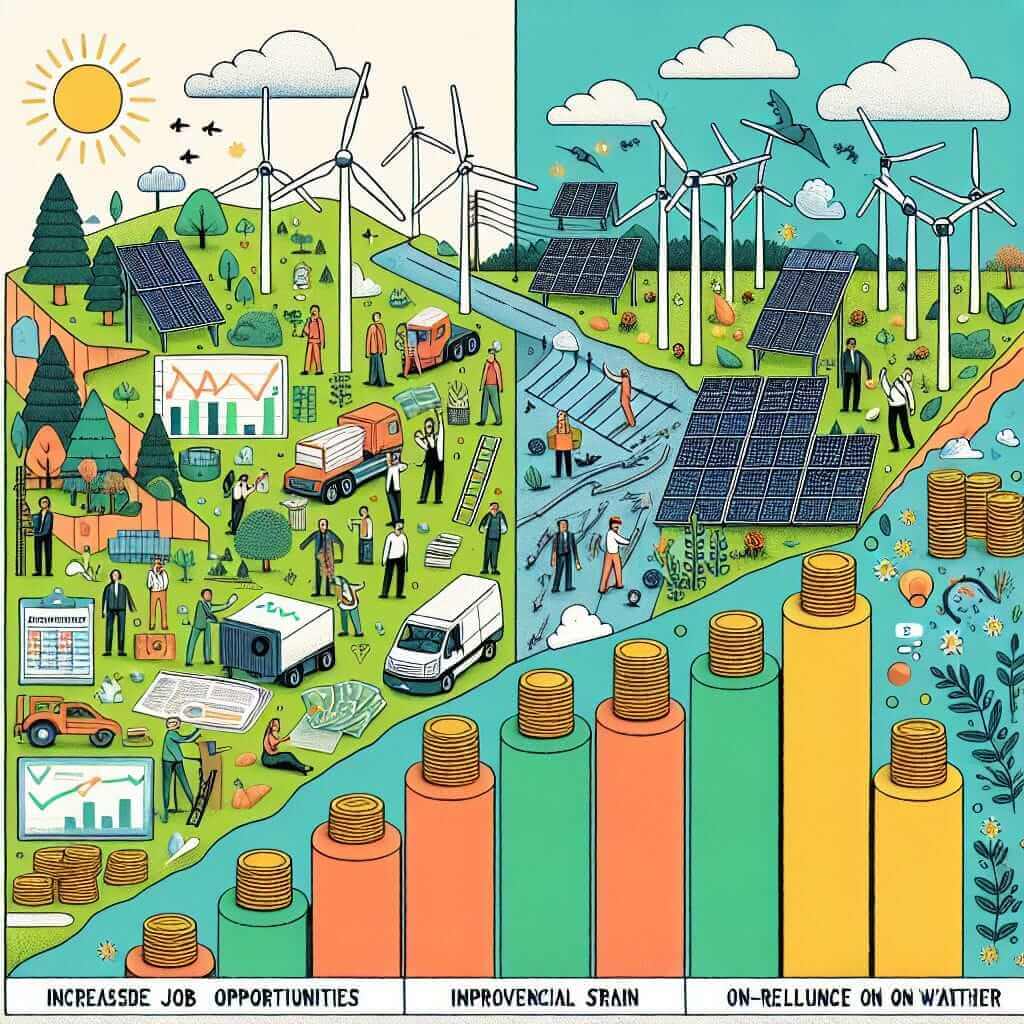The topic of renewable energy incentives is becoming increasingly prevalent in the context of modern energy policies. The frequent appearance of this subject in IELTS Writing Task 2 exams signifies its relevance, making it paramount for candidates to understand and articulate their opinions on it effectively. In this article, we will provide various essay prompts related to this key topic and delve into a detailed sample essay, ensuring alignment with the IELTS Writing Task 2 band 8 criteria.
Potential Essay Prompts:
- Governments around the world are providing incentives for renewable energy. Discuss the benefits and drawbacks of this approach.
- To what extent do you agree or disagree with the claim that government incentives for renewable energy are crucial for sustainable development?
- Some believe that renewable energy incentives provided by governments are an effective way to tackle climate change. Discuss both views and give your opinion.
Main Content
Selected Prompt
For our comprehensive analysis, let’s take the following prompt:
“Governments around the world are providing incentives for renewable energy. Discuss the benefits and drawbacks of this approach.”
Essay Analysis
Task Analysis: This essay prompt asks test-takers to evaluate both the positive and negative aspects of government incentives for renewable energy. It requires a balanced discussion, acknowledging various perspectives before concluding.
Sample Essay
Governments across the globe are increasingly turning to incentives to foster the adoption of renewable energy sources. This tactic aims to address pressing environmental issues and reduce the dependency on fossil fuels. However, while the benefits of such incentives are numerous, there are also significant drawbacks that merit consideration.
One of the primary advantages of renewable energy incentives is the promotion of sustainable development. By offering financial benefits such as tax breaks, subsidies, and grants, governments can accelerate the shift towards cleaner energy sources. This transition not only helps mitigate the effects of climate change by reducing greenhouse gas emissions but also conserves finite natural resources. Consequently, countries that embrace these incentives tend to witness a decrease in their carbon footprint, contributing positively to global environmental efforts.
Moreover, renewable energy incentives can stimulate economic growth. Incentives attract investments in renewable energy projects, creating numerous job opportunities in sectors such as manufacturing, installation, and maintenance of renewable energy infrastructure. This economic activity can revitalize local economies, especially in regions that have been historically reliant on fossil fuel industries.
 Renewable Energy Incentives Illustration
Renewable Energy Incentives Illustration
On the flip side, there are notable disadvantages to such government-led incentive programs. First, the financial burden on the state can be substantial. Funding incentives often require large sums of money, which may strain national budgets, particularly in developing countries with limited resources. Additionally, these funds might be diverted from other crucial areas such as healthcare and education, potentially leading to imbalances in public spending.
Furthermore, the effectiveness of renewable energy incentives can be inconsistent. In some cases, poorly designed policies or a lack of adequate infrastructure can hinder the implementation of renewable energy projects. For example, without robust transmission systems to support the integration of renewable energy into the grid, even the most generous incentives may fall short of their objectives. Additionally, there may be resistance from established fossil fuel industries that possess significant political and economic influence.
In conclusion, while renewable energy incentives by governments undeniably offer substantial benefits, such as promoting sustainable development and boosting economic growth, they are not without their drawbacks. The financial strain on state resources and potential implementation challenges must be carefully managed to ensure these incentives achieve their intended goals. Hence, a well-balanced approach, encompassing comprehensive policy design and strategic allocation of funds, is essential for these incentives to be truly effective.
Word Count: 368
Key Considerations When Writing About This Topic
- Balanced Discussion: Ensure you discuss both sides of the argument fairly before concluding.
- Clear Structure: Follow a clear structure, including an introduction, body paragraphs (benefits and drawbacks), and a conclusion.
- Advanced Vocabulary: Utilize topic-specific vocabulary related to energy and incentives.
Vocabulary to Remember
- Incentives (n): [ɪnˈsɛntɪvz] – Something that motivates or encourages one to do something.
- Subsidies (n): [ˈsʌbsɪdiz] – Financial assistance given by the government to support a specific economic sector.
- Mitigate (v): [ˈmɪtɪɡeɪt] – To make less severe or serious.
- Infrastructure (n): [ˈɪnfrəˌstrʌktʃər] – The fundamental facilities and systems serving a country, city, or area.
- Carbon Footprint (n): [ˈkɑːrbən ˈfʊtprɪnt] – The total amount of greenhouse gases emitted by an individual, organization, or product.
Conclusion
In summary, renewable energy incentives play a critical role in driving the adoption of sustainable energy practices globally. By understanding the benefits and drawbacks of such measures, IELTS candidates can better prepare for possible essay prompts on this topic. For further practice, consider exploring additional prompts such as the impact of renewable energy on global economies or the role of technology in enhancing renewable energy solutions.


